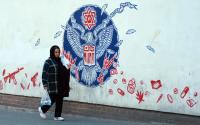8 March 2005
SIGNIFICANCE: Both the military and the Justice and Development Party
(AKP) government sought to avoid a confrontation in the run-up to the December EU summit for fear of derailing Turkey's hopes of receiving a date for the opening of accession negotiations. However, with the date virtually secured, the constraints on hard-liners within both the AKP and the military have been lifted.
ANALYSIS: When the Justice and Development Party (AKP) came to power in November 2002 its conservative grassroots expected it to take measures to soften the often draconian Turkish interpretation of secularism, including lifting the ban on women wearing headscarves in state institutions and easing restrictions on religious schools. Such plans were anathema to the military, which has long regarded itself as the guardian of Turkey's secular legacy
Mutual constraints. During its first two years in office the AKP concentrated on ensuring recovery from the 2001 economic crisis and securing a date for the opening of accession negotiations with the EU.
Although the government made tentative moves to relax the restrictions on both the headscarf and religious education, it quickly backed down in the face of warnings from the military for fear that a major confrontation could derail both of its broader goals (see TURKEY/EU: AKP moves boost case for EU accession - June 11, 2004).
The military high command was also anxious to avoid a confrontation.
Since he was appointed chief of the Turkish General Staff (TGS) in August 2002, General Hilmi Ozkok has been under intense pressure from within the armed forces to be more assertive in his dealings with the AKP government, which most officers still suspect of harbouring a long-term Islamist agenda. However, even if he were to accede to their wishes, Ozkok faces constraints:
1. Loss of influence. Unlike under previous governments, mutual
suspicions have prevented the establishment of a network of personal contacts between high-ranking members of the TGS and leading members of the AKP, making it much more difficult for the military to exert informal influence out of the public eye. The reduction in both the powers and the frequency of meetings of the National Security Council has weakened the one regular institutional platform on which the TGS had traditionally set policy parameters for the civilian government. This has left public comments on policy issues as the main instrument by which the TGS can apply pressure. Yet this carries considerable risks.
2. EU commitment. Although most high-ranking members of the TGS
doubt that the EU will ever accept Turkey as a member and are uneasy about many of the concessions required by the accession process, they remain committed to membership because they believe it:
* represents the culmination of Ataturk's policy of
modernisation and westernisation; and
* will product higher levels of education and welfare,
which will reduce the electoral appeal of Islamist or separatist Kurdish political parties.
Ozkok is also aware that the vast majority of the Turkish public supports the idea of EU accession and that overt interference would antagonise the EU. Furthermore, the military's ability to exercise political leverage depends primarily on its continuing high public prestige rather than its ability to put troops on the streets. As a result, he has avoided overt interventions in the political sphere unless he believes that a vital issue is at stake, eg in May to prevent the government easing restrictions on religious education.
Delayed confrontation. However, privately, AKP officials admit that their priority, in contrast to the military, is the accession process rather than ultimate membership. They believe that the harmonisation with EU norms required by the accession process will:
* ease constraints on freedom of expression, eventually
resulting in a lifting of the headscarf ban and the restrictions on religious education;
* raise welfare levels by ensuring economic stability and
increasing foreign investment; and
* reduce the political influence of the military,
including a possible move to subordinate the TGS to the defence minister rather than the prime minister.
Hence, even hard-line Islamist elements in the AKP were prepared to be patient until Turkey had secured a date for the opening of negotiations, thereby locking Turkey into the accession process.
However, during 2004 doubts appeared about the benefits of further integration with the EU following the decision by the European Court of Human Rights to uphold the ban on headscarves in Turkish universities and the ban on them in French schools.
AKP unrest. Ozkok remains confident that Prime Minister Tayyip Erdogan will not attempt to ease restrictions on headscarves or religious education but will concentrate on the economy. However, Erdogan faces growing unrest within the AKP, where anger at his autocratic style and predilection for surrounding himself with a small clique of trusted advisers is likely to become increasingly compounded by his reluctance to challenge the military.
Although it has attracted a handful of disillusioned liberals, the AKP remains a deeply conservative party. Nearly all of its members have female relatives who are currently debarred by the headscarf ban from holding public office, joining the civil service or receiving a university education. Even if Erdogan would prefer to delay tackling these issues, others in the AKP are likely to be less patient.
Military divisions. Nor do all the other members of the TGS share Ozkok's optimism about Erdogan's intentions. Retired and serving officers are already networking ready to apply pressure to Ozkok should the need arise. Both Land Forces Commander General Yasar Buyukanit and Deputy Chief of Staff Ilker Basbug are known hard-liners. Buyukanit currently stands to take over from Ozkok when the latter retires in August 2006. As a result, he is biding his time and has been cautious about speaking out publicly on domestic issues.
However, in January, as the government continued to assure the EU that it would do everything possible to solve the Cyprus issue, Buyukanit publicly announced that no Turkish troops would be withdrawn from the island before a comprehensive settlement. Not only did he not consult the government beforehand, but his remarks appear not to have been cleared with Ozkok.
At the same time, with Ozkok's approval but again without consulting the government, Basbug held a press briefing in which he effectively warned the Iraqi Kurds that any attempt to take control of Kirkuk would invite a military response from Turkey. Although Erdogan subsequently expressed his government's concern about developments in northern Iraq, his failure to support or respond to Buyukanit's statement was a clear indication of a major rift on one of the key issues affecting Turkey's relations with the EU.
Both Basbug and Buyukanit's statements demonstrate that there are issues on which members of the TGS are willing to challenge both the civilian government and Turkey's foreign allies. They were also evidence that not only Erdogan but also Ozkok has an internal constituency to appease. These constituencies have diametrically opposed domestic agendas and, at some point, a confrontation appears inevitable.
CONCLUSION: Although both Erdogan and Ozkok appear willing to try to postpone a confrontation as long as possible, they each have hard-line
-- and less pragmatic -- constituencies which they have to appease.
Eventually, a confrontation over mutually incompatible interpretations of secularism appears inevitable.
Oxford Analytica






